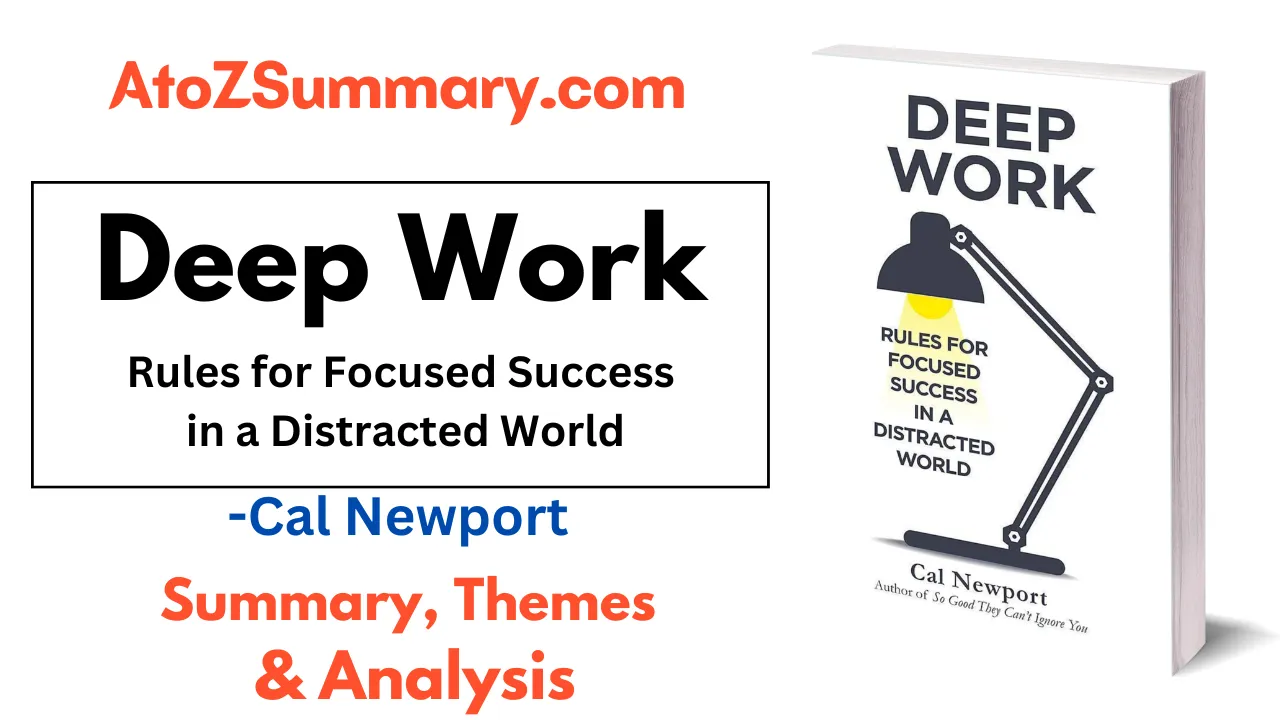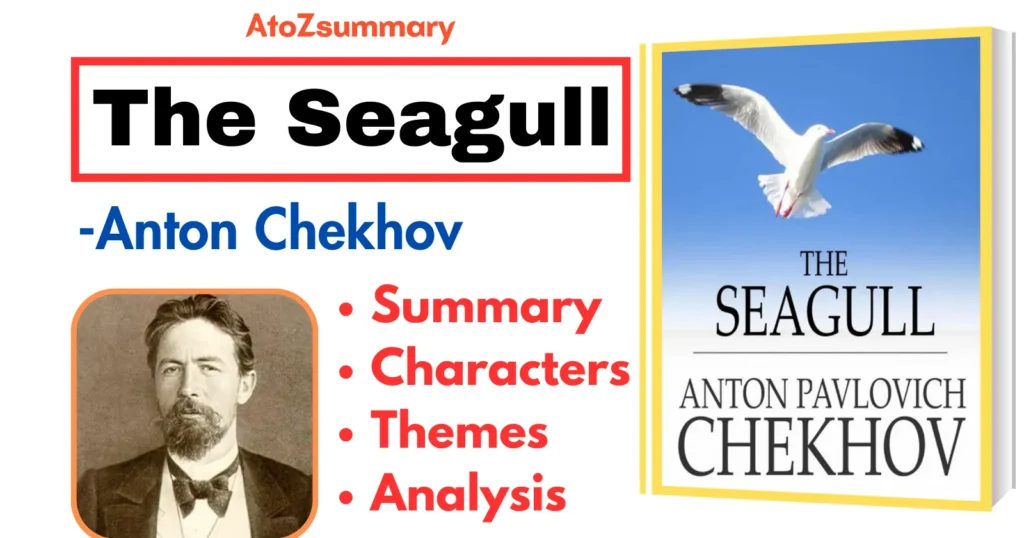| Title | Deep Work: Rules for Focused Success in a Distracted World |
| Author | Cal Newport |
| Publication Date | January 5, 2016 |
| Genre | Nonfiction, Self-help & Productivity |
| Synopsis | “Deep Work” by Cal Newport argues that the ability to focus deeply is becoming increasingly valuable in our distracted world and offers practical strategies for cultivating this skill to enhance productivity and creativity. |
| Pages | 304 |
| Publisher | Grand Central Publishing |
| ISBN-10 | 1455586692 |
| ISBN-13 | 978-1455586691 |
About the Book-Deep Work
Deep work by Cal Newport is a must read for anyone who wants to improve their productivity, focus and creativity. In the book Newport describes about how distractions are preventing us from achieving the highest levels of success and offers strategies to help us stay focused on our most important tasks. He also explains why deep work focusing deeply on a task for a long period of time is essential to success and how to develop the skills necessary to do so.
The book provides insights into the benefits of deep work including increased productivity, greater creativity and improved concentration. Ultimately Newport seeks to help readers cultivate the mental discipline needed to achieve their highest levels of success, with his guidance readers will be able to make more effective use of their time, develop better problem-solving skills and become more productive in every area of life.
If you’re looking for a practical guide to help you stay focused and reach your Highest Potential deep work by Cal Newport is an invaluable resource.
Themes
- The Importance of Deep Work
- Eliminating Distractions
- Developing Productive Habits
- The Benefits of Deep Work
- The Role of Technology
- Creating a Deep Work Culture
- Overcoming Resistance to Deep Work
Idea 1- How deep work can help you
The author says that deep work is any kind of work that is done without interruptions so that the person can use all of their mental abilities to the fullest but work can also be surface level comes in a form of boring work that has to be done no matter how focused you are work that doesn’t go very deep doesn’t move the field forward and is easy to copy.
For deep work that pays off in the form of skill development you need to be able to concentrate and stay on task because of this value is added but it’s hard to copy, on the other hand shallow work is often used to describe jobs that don’t require much thought it doesn’t require much thought so, the action is done while the person is thinking about something else. This is work that can be done again and again, checking email every few minutes and responding to push notifications are two examples of such tasks from sources like news websites, Twitter and Facebook.
You are good at this kind of work because it comes naturally to you and you take pride in doing even the most simple tasks. People who can do deep work are becoming more in demand because there are fewer people who can do it so, you will be successful if you can train yourself to do this. When automation takes away their jobs and the chance to use their skills a lot of people will suffer and die. The next group will also do well and have a lot of success . The staff is very well trained and many low-skilled jobs will go away as they are filled by people who know how to talk to and work with complicated machines.
To put it another way the well-known ones this group knows that it’s not enough to just be the best in a certain market but there are a lot of performances on the market people will only choose the best ones no matter how small the edge may be. They are the ones who own the property, people with a lot of money who take risks on new technologies that could change the way we live. You want to do well in today’s machine driven economy you need to have these two basic skills.
The ability to learn hard things quickly. The machines that make up the new economic order are harder to understand and take charge if they use command lines that are hard to understand like SQL. How successful you are in the modern world will depend on how well you can use automated systems having the ability to keep up a high level of speed and quality and all work done. You need to be aware of the fast changes in your industry and be able to adapt to them. Without this skill it will be hard at best to learn Advanced languages and reach your full potential.
Idea 2- Distractions and the urge to do more than one thing at once are the worst things for efficiency
Many people think wrongly that doing more than one thing at once makes them more efficient because switching from one task to another makes you less productive. Sophie Laraway, a business administration associate professor at the University of Minnesota looked into this event in 2009.
She shows that when we switch from task A to task B our attention is still on task A which makes us less good at task B. She split the people she was working with into two groups. She did word puzzles until she told them to stop. So, Group B could read resumes and make hypothetical hiring decisions there I would give a short quiz during the break between the two activities to see how many puzzle related words the participants could remember exactly how compared to Group B, group A was much more focused on the puzzle and paid less attention to the most important goal which was to find the best person for the job.
To shorten a long story multitasking is useless in terms of getting things done having access to the internet all the time is just as annoying even though having social network and email tabs open on your computer may not seem like a big deal just seeing things pop up on your screen is enough to make you lose focus even if you don’t respond right away. One study from 2012 by the consultant firm McKinsey showed that employees spend more than 60 percent of their work weeks using online communication tools and browsing the internet while only 30% is spent Reading and Responding to emails. Even with these numbers it may seem like everyone in the workforce is busier than ever simply put. We think we’re productive because we switch between tasks and information all the time but in reality this just makes us feel busy and Scattered.
Idea 3- Rules for deep work
If you already knew how deep work can make you more productive you might have thought that getting that information was the easy part instead it does something. We are bad at doing more than one thing at once because we are easily distracted by following these rules. You’ll learn how to make deep work a regular part of your life.
Try your hardest, have fun with being bored, put down your accounts on social media, just train the shallows to make the water deeper, don’t mess around with your work. Many people don’t want to put in the time and effort needed to do work that matters. Our environment’s culture makes deployment much more challenging except that you’re not very interesting. Train yourself to pay close attention you need to work on your ability to focus outside of work hours just like athletes train their bodies when they are not in competition.
If you always give in to distractions at the first sign of boredom it’s hard to get the kind of focused attention you need for deep work. There’s also the matter of retraining and reconditioning your brain to be easily distracted this way or getting off track will keep happening over and over. Even if you set out to do serious detailed work it used to be boring. If you want to avoid this when your phone makes a beeping sound you shouldn’t check it every time. Train yourself to stay on task and ignore distractions.
The third rule is to stop using all social media sites. Using social media is a great example of how to live a shallow life. The author says that our time spent on them doesn’t give us anything useful in return. If you feel like you have to check social media every few minutes it will be hard to concentrate for long periods. Social media isn’t a good fit for a deep life because it’s so easy to get hooked on.
The fourth rule number Is to avoid the shallows. The title of the book The Shallows shows how people’s minds change for the worse when they use the internet. In the previous chapters shallow work included things like meetings, phone calls and email responses.
Idea 4- The “flow” state is reached by Deep work
This is the key to doing good work most people say that they are happiest when they are doing something important. Mihali chicks at mihadi who came up with the idea of flow agrees with newport’s ideas about deep work. Mihali chick said mihali a psychologist and the author of flow found that people feel a sense of flow or satisfaction and purpose when they focus on a useful task and are pushed to their cognitive limits that is the task is mattered too hard nor too easy.
Newport points out that contrary to what most people think leisure time does not make people as happy there is nothing more rewarding than pushing yourself to your mental limits but free time is Tomb unstructured and requires too much work to turn into anything worthwhile. Newport says that the desire for Mastery autonomy and purpose are Universal Behavior drivers that are met when a person is in a state of flow.
Idea 5- Deep work is a great way to keep your mind in good shape
When you work hard you can block out a lot of negative and distracting noise from the outside world. It’s easy to think that things that happen to you are to blame for not being happy but research shows that your outlook on life is more affected by what you choose to pay attention to. But in the same situation you can choose to be happy by focusing on the good things or sad by focusing on the bad things.
When you’re busy it’s easier to focus on all the things that are wrong with your life than on all the things that are right. If you don’t have anything positive to think about it’s easy to let your mind wander to the bad things instead of the good ones. Email is hard on the mind because it reminds you of Unfinished Business and bad feedback from other people.
Idea 6- When you do deep work you feel like you’ve accomplished something important
Last Newport makes his most obscure argument for profound work. He says that deep work is what makes a job worth doing. People used to think that what they did was for the greater good which made it easier for them to find purpose in their lives. People stopped looking to their religions for meaning after the Enlightenment and the rise of secularism instead they began to look elsewhere. Some people might be driven to nihilism by this but artists have often found meaning in the things they make from raw materials that don’t seem to have any.
For instance finding a beautifully carved table hidden in a piece of wood can give you a sense of purpose. At first glance, the work of a Craftsman may seem easy like carving marble or weaving a blanket however it takes a lot of skill to bring out the beauty that is already there in the materials because the goals of a knowledge worker’s job are less clear and harder to measure than those of an artisan it may be hard for these workers to feel fulfilled by their work.
Newport says that a piece of computer code, a marketing slogan, a business plan or a new piece of technology can all be beautiful if you approach them with the right mindset and look for the deeper meanings.
About the Author-Cal Newport
| Field | Details |
|---|---|
| Full Name | Cal Newport |
| Birth Date | June 23, 1982 |
| Nationality | American |
| Alma Mater | Dartmouth College (B.S., Computer Science) Massachusetts Institute of Technology (Ph.D., Computer Science) |
| Occupation | Author, computer science professor |
| Genre | Self-help, productivity, career |
| Notable Works | “Deep Work: Rules for Focused Success in a Distracted World” “So Good They Can’t Ignore You: Why Skills Trump Passion in the Quest for Work You Love” “Digital Minimalism: Choosing a Focused Life in a Noisy World” |
| @calnewport |
FAQs
What is the main idea of “Deep Work”?
The main idea of “Deep Work” is that the ability to concentrate without distraction is becoming increasingly valuable in today’s economy and that cultivating this skill is the key to success in many fields.
How does Deep Work differ from other productivity books?
Deep Work highlights the value of working with deep attention and concentration rather than just aiming to accomplish more in less time.
What are some tips for practicing Deep Work?
Some tips for practicing Deep Work include setting aside specific times for focused work, eliminating distractions, creating a conducive work environment and taking breaks to recharge.









![Regretting You Summary, Themes, Synopsis & Characters [Book by Colleen Hoover] Regretting You Summary, Themes, Synopsis & Characters [Book by Colleen Hoover]](https://atozsummary.com/wp-content/uploads/2023/05/Regretting-You-Summary-Themes-Synopsis-Characters-Book-by-Colleen-Hoover-1024x576.webp)

